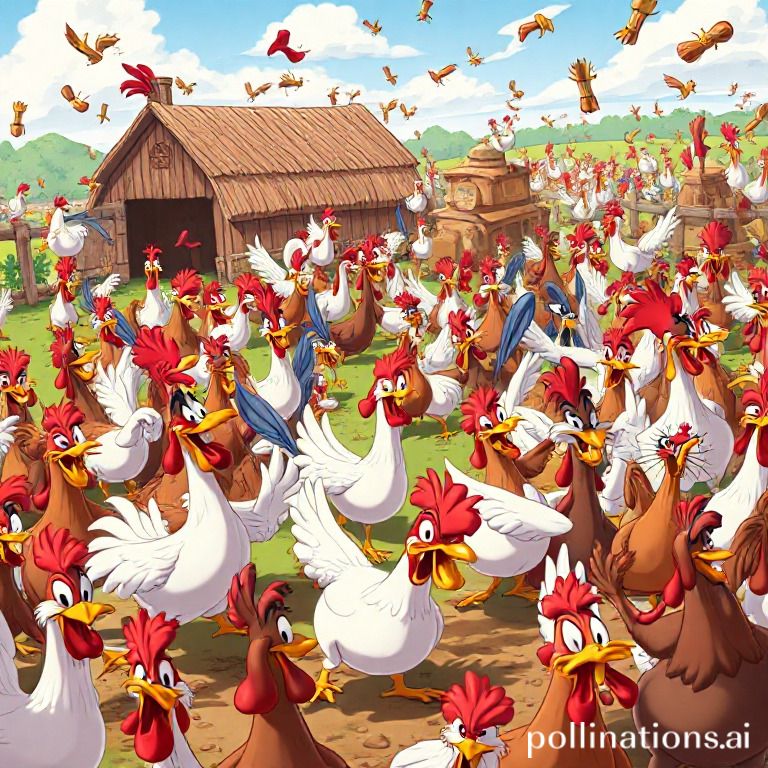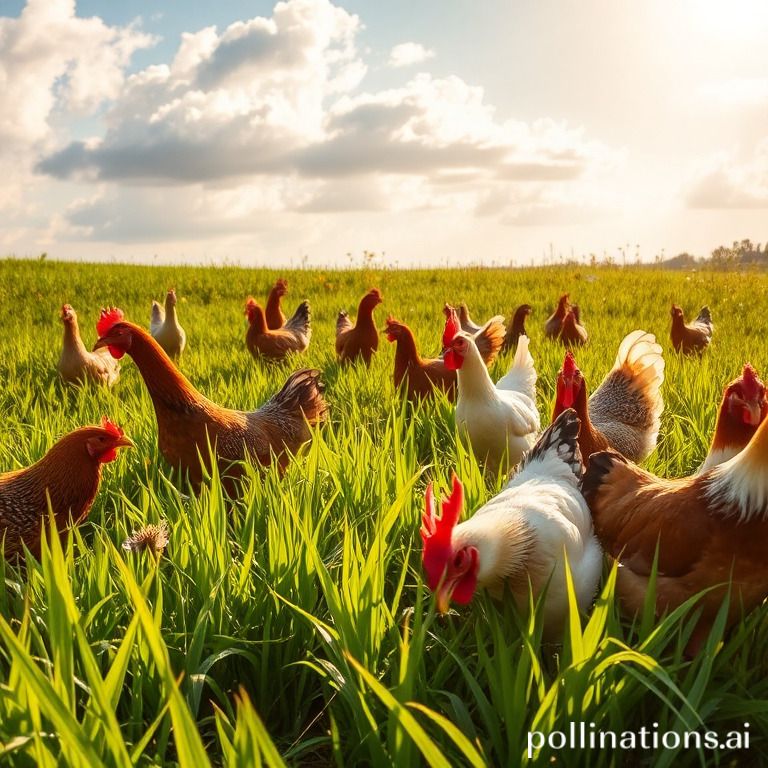There’s nothing quite like the thrill of collecting your first farm fresh egg from your flock of happy hens. From the moment they start laying at around 18 weeks of age, you can expect a daily supply of eggs that will bring joy to your breakfast table.
But have you ever wondered how long chickens actually lay eggs? And do the number of eggs change as your hens get older? In this #FlockStrong article, we dive into the world of egg-laying chickens to explore their laying lifespan and the secrets behind their productivity. Join us as we uncover the truth about chickens and their incredible egg-laying abilities.
Common Reasons for Chicken Aggression
To maintain a harmonious flock, it is important to understand why chickens can become aggressive. By identifying the underlying causes, you can address the issues and create a safer environment for both your chickens and yourself.
1. Instinct for self-protection
Chickens have a natural instinct to protect themselves and their territory. When they feel threatened by predators, unfamiliar humans, or animals, they may exhibit aggressive behavior. This can include flapping wings, pecking, or lunging. It is crucial to understand this instinct in order to handle your chickens with care and caution, especially when they perceive danger.
2. Territory and dominance conflicts
Chickens establish a pecking order within their flock, which determines their social hierarchy. Dominant birds may display aggression towards lower-ranking ones to maintain their status and protect their territory. This behavior can manifest as pecking, chasing, or even feather pulling. Providing sufficient space, food, and resources for all chickens can help reduce territorial disputes and minimize aggression.
3. Triggers of fear or stress
Like any living creature, chickens can experience fear and stress, which can lead to aggressive behavior. Loud noises, sudden movements, or unfamiliar surroundings can trigger their flight-or-fight response, causing them to become defensive. By minimizing stressors and creating a calm and predictable environment, you can help alleviate fear-induced aggression in your chickens.
4. Hormonal changes during breeding season
During the breeding season, hormonal changes can cause chickens, especially roosters, to become more territorial and aggressive. They may display protective behavior towards hens or show aggression towards other male chickens. Providing ample space for chickens to establish their territories and separating aggressive individuals if necessary can help manage aggression during the breeding season.

Indicators of Aggressive Behavior
Recognizing signs of aggressive behavior in chickens is vital for the safety of humans and other animals on the farm or in the backyard. By Absorbing these signs and symptoms, you can take appropriate action to handle or prevent such aggressive encounters. Here are some important indicators to be aware of:
1. Aggressive Body Language
Chickens display various body language cues when they feel aggressive or territorial. These include:
- Raised hackles
- Aggressive flapping of wings
- Directly facing the target with an upright posture
- Walking or hopping with stiff legs
Recognizing these body language signals enables you to stay vigilant to potential aggressive behavior and take appropriate action to avoid confrontations.
2. Vocalizations and Warning Signs
Chickens communicate their aggression through vocalizations and warning signs. Pay attention to the following auditory cues:
- Loud, persistent clucking or squawking
- Growling or hissing sounds
- Distinctive warning calls
These vocalizations serve as an alert for both humans and other chickens to keep their distance and avoid potential conflict.
3. Aggressive Pecking and Chasing
Aggressive pecking and chasing are common behaviors in chickens. Look out for the following signs:
- Forceful pecking at humans or other animals
- Relentless chasing and cornering of targets
These aggressive actions can cause injuries, especially if the pecks are directed at vulnerable areas like the eyes or head. It’s crucial to intervene and separate the aggressive chicken from its target.
4. Property Damage or Attacks on Other Animals
Aggressive chickens may engage in destructive behavior towards property or other animals. Watch out for:
- Scratching or pecking at fences, coops, or equipment
- Attacking and injuring other chickens or pets
Such behavior can cause harm or damage, and it’s important to address the underlying causes to prevent further escalation.
Absorbing the signs and symptoms of aggressive behavior in chickens is crucial for maintaining a safe environment. By closely observing their body language, vocalizations, and actions, you can effectively address and prevent aggression, ensuring the well-being of both chickens and those around them.
Tips for Dealing with Aggressive Chickens
Dealing with aggressive behavior in chickens can be a challenge, but it can be effectively managed with the right approach. Here are some tips to help you handle aggressive chickens:
1. Establishing yourself as the leader of the flock
Chickens have a hierarchical nature and need a strong leader to maintain order within the flock. To establish yourself as the leader:
- Handle the chickens with confidence and assertiveness
- Use calm body language and voice, but be firm
- Consistently enforce rules and boundaries
2. Using positive reinforcement training methods
Positive reinforcement training can be an effective way to modify aggressive behavior in chickens. Here are some techniques to try:
- Reward desired behavior with treats, praise, or attention
- Redirect aggressive behavior towards more appropriate activities
- Incorporate clicker training to reinforce positive behavior
3. Providing a safe and spacious living environment
An overcrowded or stressful living environment can contribute to aggressive behavior in chickens. Ensure that their living environment is:
- Spacious, allowing them to move freely
- Secure, with proper fencing and protection from predators
- Equipped with sufficient resources, including food, water, and nesting areas
4. Identifying and addressing triggers for aggression
Apprehending the triggers that lead to aggression is crucial in effectively managing it. Some common triggers for aggression in chickens are:
- Overcrowding or competition for resources
- Fear or situations that cause stress
- Protecting their territory or offspring
By identifying and addressing these triggers, you can help prevent aggressive behavior and create a more peaceful environment for your chickens.
Dealing with aggressive chickens requires patience, consistency, and Apprehending. By implementing these tips, you can promote a safer and more harmonious dynamic within your flock.

Preventing Chicken Attacks
In regard to preventing chicken attacks, there are several important factors to consider. By abiding by these guidelines, you can minimize the risk of aggression and ensure a harmonious environment for both humans and chickens.
1. Proper Socialization from an Early Age
One of the key factors in preventing chicken attacks is proper socialization from an early age. This involves exposing chicks to different environments, people, and animals to help them become familiar and comfortable with their surroundings. By providing positive interactions early on, chickens are less likely to develop aggressive behaviors towards unfamiliar beings.
2. Regular Interaction with Humans and Other Animals
Regular interaction with humans and other animals is essential for chickens to develop good social skills. By spending time with them, handling them gently, and offering treats, chickens learn to associate humans with positive experiences. Additionally, introducing them to other animals, such as dogs or cats, in a controlled and supervised environment can help them become more comfortable around different species.
3. Ensuring a Balanced Diet and Environmental Enrichment
A balanced diet plays a crucial role in maintaining the overall well-being of chickens. Providing them with nutritionally balanced feed and access to fresh water helps prevent nutritional deficiencies that can lead to behavioral issues. In addition to diet, environmental enrichment is important to keep chickens mentally stimulated. This can be achieved by offering toys, perches, and opportunities for foraging, which help reduce boredom and frustration that may contribute to aggression.
4. Implementing Flock Management Strategies
Proper flock management is essential in preventing chicken attacks. This includes monitoring the flock dynamics, ensuring adequate space and resources for all chickens, and addressing any signs of aggression promptly. It is important to separate aggressive individuals from the rest of the flock if necessary and provide them with alternative housing arrangements. Additionally, providing appropriate housing and predator protection can help alleviate stress and reduce the risk of aggressive behaviors.
Table: Tips for Preventing Chicken Attacks
| Tips |
|---|
| Properly socialize chickens from an early age |
| Regularly interact with chickens and introduce them to other animals |
| Ensure a balanced diet and provide environmental enrichment |
| Implement effective flock management strategies |
Real-Life Examples of Chicken Attacks
1. Personal experiences shared by chicken owners
Many individuals who own chickens have encountered instances where their once calm and friendly birds unexpectedly display aggressive behavior. These personal experiences provide valuable insights into the various factors that can trigger chicken attacks and how to address them.
2. Case studies on chicken aggression in specific situations
Examining specific case studies can provide a deeper Apprehending of chicken aggression in different scenarios. These studies may include examples where chickens have attacked humans or other animals due to territorial disputes, fear, or protective instincts. By analyzing these cases, readers can gain valuable knowledge on how to prevent or manage similar situations.
3. Expert opinions and insights on managing aggressive chickens
Experts in the field of poultry behavior and husbandry can offer valuable insights into Apprehending, preventing, and managing chicken aggression. Their opinions and advice can range from identifying early signs of aggression to implementing effective strategies for dealing with aggressive chickens. By enmeshing expert opinions, readers can benefit from evidence-based practices and expert guidance.
Conclusion
Cognizing and addressing chicken aggression is crucial for responsible chicken ownership and management. By recognizing the significance of this issue, owners can take proactive steps to ensure the well-being and safety of their flock.
From identifying the root causes of aggression to implementing effective management strategies, it is essential to prioritize the welfare of chickens and prevent any harm to other animals or humans. By fostering a peaceful and harmonious environment, chicken owners can create a positive and rewarding experience Whilst enjoying the benefits of raising these fascinating birds.
Frequently Asked Questions about Chicken Attacks
FAQ 1: How common are chicken attacks?
Chicken attacks are relatively uncommon incidents. Meanwhile chickens can display aggressive behavior, such as pecking or charging, it is not a widespread occurrence. Most chickens are docile and pose no threat to humans.FAQ 2: Can roosters be more aggressive than hens?
Yes, roosters have the potential to be more aggressive than hens. Roosters are known to be protective of their flock and may exhibit territorial behavior. In contrast, not all roosters display aggressive tendencies, and individual personalities can vary.FAQ 3: What should I do if a chicken attacks me?
If a chicken attacks you, it is important to stay calm and avoid reacting aggressively. Try to create distance between yourself and the chicken by moving slowly. You can use a broom, a bucket, or any other object to gently keep the chicken away from you. If you are repeatedly attacked or feel threatened, seek assistance from a professional or someone experienced with handling chickens.FAQ 4: Are certain chicken breeds more prone to aggression?
Some chicken breeds may have a higher tendency for aggression than others. For example, certain game fowl breeds are known for their more aggressive nature. In contrast, it is crucial to remember that individual temperament can vary within each breed, and proper handling and socialization can greatly influence a chicken’s behavior.FAQ 5: Can chicken aggression be completely eliminated?
Meanwhile it may not be possible to completely eliminate aggression in chickens, there are measures that can be taken to manage and minimize it. Providing adequate space, proper nutrition, and socialization can help reduce aggression. Additionally, neutering or separating aggressive individuals from the flock may be necessary in some cases. It is important to consult with a poultry expert or veterinarian for specific guidance on dealing with aggression in chickens.Read Similar Post:
1. Do Chickens Eat Less When Molting?
2. How Do Chickens Keep Cool?

